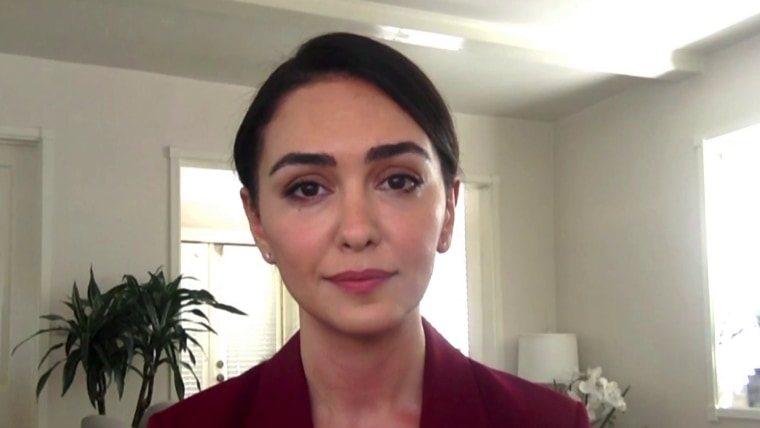For days, Ariana Afshar grappled with whether or not to post on social media about the death of Mahsa Amini, a 22-year-old Kurdish woman, in Iran.
Iranian officials are investigating after they said Amini had a pre-existing condition and suffered a heart attack in the custody of Iran’s morality police, who had arrested her for allegedly violating the country’s strictly enforced Islamic dress code. Amini’s family denies that and says witnesses told them she was beaten by police. She died days later at a hospital. Thousands of people have since been protesting the regime in the streets of Iran.
Afshar, 26, an Iranian American content creator, knew weighing in would mean she could no longer return safely to her second home, where speaking out against the regime could result in arrest. But after having mulled over the risks, she decided posting was worth the sacrifice.
The online solidarity, Afshar said, can go a long way as Iranian women fight for their freedoms after Amini’s death.
“I can’t emphasize this enough: The women in Iran are begging America and people with a platform to use their voice to speak out on what’s happening,” said Afshar, who has been posting pleas for support on TikTok.
What’s being asked for by people from Iran is purely awareness and amplification. They want to show the government that they are supported globally.
— Iranian American fashion influencer Nicolette Mason
Afshar is among the hundreds of Iranians around the globe who are criticizing the Iranian regime either directly or implicitly through their support of protesters on social media. Posts have included TikToks highlighting the rigidity of the government-imposed dress code and videos of protesters clashing with security forces. Some, including non-Iranians, have filmed themselves cutting their hair as an act of solidarity with those protesting the Islamic Republic’s laws requiring women to cover their bodies and hair.
In publicly voicing their support online, Iranians are taking inherent risks. People outside the country are forfeiting their opportunity to ever return, as they could face retaliation from the regime. Meanwhile, people who post in Iran open themselves up to becoming targets of imprisonment if they are caught.
Many who spoke with NBC News said helping generate momentum for the movement is worth it. Keeping eyes on Iran not only motivates those on the ground, they say, but it also puts pressure on the government by exposing police brutality and showing it the extent of public support for protesters.
“There’s definitely a lot of performative social media activism. But this specifically, what’s being asked for by people from Iran is purely awareness and amplification,” said Nicolette Mason, an Iranian American fashion influencer who shared an Instagram reel recounting how her mother and her family fled during the 1979 Iranian revolution with only what they could carry. “They want to show the government that they are supported globally. And so, in this moment, it feels really important.”
Social media has long been a vital tool for Iranians, who have used apps to document human rights abuses and to mobilize, according to the Atlantic Council, which published a report this year about Iranians and social media usage.
In 2009, “countless videos of demonstrations across various cities were uploaded to YouTube and amplified on Facebook and Twitter, including the killing of Neda Agha Soltan, whose image became the de facto face of the movement,” the report said.
But Iranian authorities have increasingly blocked or slowed internet access over the years to suppress news and videos of mass arrests and killings committed by security forces. During the civil protests in November 2019, when more than 1,500 people were killed, Iran imposed a near-total internet shutdown lasting around a week — preventing internal video from leaking to the outside world — according to a 2020 report by Amnesty International.
This time around, the government has targeted not just mobile data, but also every other potential channel of communication — including games — said Amir Rashidi, the director of internet security and digital rights at Miaan Group, a research and advocacy group promoting human rights in Iran.
The regime’s primary goal isn’t to halt the flow of information to the outside world, Rashidi said, but to prevent Iranians from coordinating actions during peak protest hours from late afternoon to midnight.
Yet things feel different with the Amini-sparked protests, many Iranians said. Some said they feel internet outages are no longer a foolproof way for the regime to exert control. Others were moved that more people around the world seem to be paying attention. And they feel the support, thanks to social media.
In Iran, an anonymous network of people work to share video of protests
Most protesters have relied on virtual private networks and other circumvention tools to access the outside world in the face of government-imposed internet shutdowns.
After Amini’s death, a group of anonymous people began posting videos showing Iranian security forces firing down a street, women dropping their headscarves into fires, crowds of protesters advancing on security forces and other graphic incidents from the streets.
The group, known as @1500Tasvir on Instagram and Twitter, was launched to commemorate those killed during Iran’s bloody 2019 uprising, and it now works to share around-the-clock video of the ongoing protests, said a representative of the group who requested anonymity for safety reasons.
Members are based all around the country, the group member said, with a few outside Iran to help keep the accounts safe in case other members are arrested or killed.
“We saw too many people die this year. After a while, we just don’t care. You’re like, I’m going to do anything that I can to overthrow this government,” the group member said in a Telegram voice call. “Even if I die, it’s OK, because otherwise there is no meaning for life.”
She said the group’s members found one another through social media but don’t know one another’s identities. Members travel between cities to record what’s happening on any given day, as well as post videos sent in by other people.
They upload videos when they can, but Wi-Fi access is scattered and unreliable, the group member said. Even those who can connect often find the speed too low to send anything other than text messages, meaning videos of events can be delayed for days.
Iranians are ‘risking it all, because they see hope’
A Tehran-born artist now living in the U.S., who wished to remain anonymous to protect her family, all of whom live in Iran, said speaking up about the protests online means she’s indefinitely isolating herself from home.
But the artist said she felt it was worth it because the protests have caught the attention of Western societies in ways previous demonstrations didn’t.
“Even [Iranian] people who never used to risk it before are risking it all, because they see hope and they just want to help in any way possible,” she said. “People in Iran are hearing about the support, and it gives them an incentive to fight. And now that the world is watching, it’s difficult for [the government] to go into the battlefield and just kill everyone in hopes for a crackdown.”

For British-born Iranian American director Ana Lily Amirpour, news of Amini’s death felt like a “knife to the stomach.”
Amirpour, who is known for her film “A Girl Walks Home Alone at Night,” recently posted videos of herself leaving voicemails for state and federal representatives. If enough people flood politicians’ inboxes, she said, they might feel more incentive to speak out.
“I just wish there was a way to make it real for people somehow,” Amirpour said. “We should express outrage, because there’s nothing we can really do for them other than that. That’s the other really frustrating part.”
Amirpour’s Instagram reels appealing for public solidarity with Iranian women have gotten more than 800,000 views.
People are listening to the Iranian plea: ‘Sedaye ma bash’
Efforts to amplify what’s happening in Iran appear to be working.
On Thursday, Michael Del Moro, who works in communications at Meta, the parent company of Facebook, Instagram and WhatsApp, tweeted that hashtags related to Amini’s death were used more than 45 million times around the world on Instagram. A spokesperson for Meta didn’t immediately respond to a request for comment.
Notable Iranian celebrities, such as Nazanin Boniadi and Maz Jobrani, have been vocal about their support for their homeland.
In Iran, some prominent figures — including Oscar-winning director Asghar Farhadi and soccer star Sardar Azmoun — also publicly supported Iran, gestures from highly regarded men in the country that put them at the forefront of potential scrutiny from Iranian officials.
“I invite all artists, filmmakers, intellectuals, civil rights activists from all over the world … everyone who believes in human dignity and freedom, to stand in solidarity with the powerful and brave women and men of Iran by making videos, in writing or any other way,” Farhadi said in an Instagram video.
On Tuesday, Iranian national team soccer players covered the country’s emblem during the national anthem before a game against Senegal, Sports Illustrated reported.
In the U.S., Jessica Chastain, Kate Beckinsale, Questlove and other stars have shared social media posts about Amini’s death.
The Treasury Department issued guidance last week expanding the breadth of internet services available to Iranians despite U.S. sanctions on the country, Reuters reported. CEO Elon Musk said Monday that SpaceX would provide Starlink, its satellite broadband service, to Iranians and that it would ask for an exception to the sanctions to do so.
Still, some experts say, the Iranian people have a long way to go in terms of the movement.
“Iranians would do well to realize that they are playing a long game, and that unseating or transforming a dictatorship as entrenched as the Islamic Republic is a chess match far more than a bout of arm wrestling,” journalist Borzou Daragahi wrote in a post for the Atlantic Council’s IranSource. “In Iran, the momentum is there. It just needs direction and a helping hand.”
Rashidi, of Miaan Group, said that the solidarity around the world is important — but that protesters would also benefit from the attention of the United Nations or the U.S. government and the European Union. But he and many other Iranian advocates said they are wary of traditional Western involvement.
“They can help as long as it’s by providing services that enable people to basically keep the flow of information going,” Rashidi said. “That typical intervention that Western countries usually do in the Middle East, no, we don’t need. But there are things that they can do and they have power to do.”
Ultimately, many Iranians hope people continue to be vocal in their solidarity online as protests reach the two-week mark. One specific plea inundates social media: “Sedaye ma bash” — which translates to “Be our voice.”
Techyrack Website stock market day trading and youtube monetization and adsense Approval
Adsense Arbitrage website traffic Get Adsense Approval Google Adsense Earnings Traffic Arbitrage YouTube Monetization YouTube Monetization, Watchtime and Subscribers Ready Monetized Autoblog
from World News – My Blog https://ift.tt/rYoR014
via IFTTT


No comments:
Post a Comment